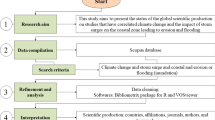Abstract
The large-scale study of ship's logbooks for climatic data has revealed the wide and varied potential of this under-exploited resource for the study of the past. As well as being of utility to climatologists, the daily recording of shipboard information can help illuminate a number of themes of interest to maritime and naval historians. More than this, however, such studies can help inform both more general and other specialized historical studies. Logbooks contain both anecdotal and statistical data relevant to the studies of medical historians, the history of science and navigation, social history, economic history, warfare, imperial history and of course environmental history. Moreover, many of these themes can be studied in a multi-national context and furthermore, if studied in a multi-disciplinary context, can offer many useful insights.
Similar content being viewed by others
References
Byrn, J. D.: 1998, Crime and Punishment in the Royal Navy: Discipline in the Leeward Islands Station 1784–1812, Aldershot.
Churchman, J.: 1794, The Magnetic Atlas, London.
Cook, A. S.: 1985, ‘Alexander Dalrymple and John Arnold: Chronometers and the Representation of Longitude on East India Company Charts’, Vistas Astron. 28, 189–195.
Diaz, H., et al.: 2001, ‘Climate and human health linkages on multiple timescales’, in P. D. Jones, et al. (eds.), History and Climate, Kluwer Academic, New York.
Caviedes, C.: 2001, El Niño in History, University Press of Florida, Florida.
James, W.: 1859, Naval History of Great Britain, 6 vols., Richard Bentley, London.
Jonkers, A.: 2003, Earth's Magnetism in the Age of Sail, John Hopkins University Press, Baltimore, MD.
Lavery, B.: 1998, Shipboard Life and Organization 1731–1815, Navy Records Society, London.
Lloyd, C. (ed.): 1966, Health of Seamen, Navy Records Society, London.
Morriss, R.: 2003, ‘Practicality and Predjudice: the Blockade Strategy and Naval Medicine during the French Revolutionary War 1793–1801’, in Pieter van der Merwe (ed.), Science and the French and British Navies, 1700–1850, Greenwich, London.
Pope, D.: 1963, The Black Ship, Weidenfeld & Nicolson, London.
Records of Fort St George: 1968, Public despatches from England for the Years 1756–7, Egmore, Chennai, India.
Records of Fort St George: 1960, Public despatches from England for the Years 1752–3, Egmore, Chennai, India.
Rodger, N.: 1986, The Wooden World, Collins, London.
Seller, J.: 1703, The English Pilot, London.
Wilkinson, C.: 2005, ‘Peter Rainier and the East Indies Command’, in Lefevre and Harding (eds.), Contemporaries of Nelson, Chatham (in press).
Zuckerman, A.: 1976, ‘Scurvy and the Ventilation of Ships in the Royal Navy: Samuel Sutton's Contribution’, Eighteenth Century Studies 10, 222–234.
Author information
Authors and Affiliations
Corresponding author
Rights and permissions
About this article
Cite this article
Wilkinson, C. The Non-Climatic Research Potential of Ships' Logbooks and Journals. Climatic Change 73, 155–167 (2005). https://doi.org/10.1007/s10584-005-6947-3
Received:
Revised:
Issue Date:
DOI: https://doi.org/10.1007/s10584-005-6947-3




